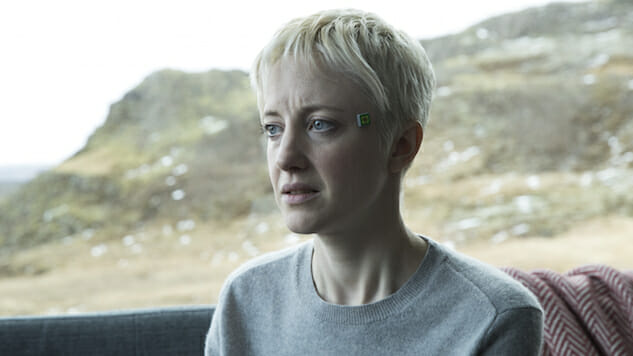Black Mirror: “Crocodile” Constructs Its Point Beautifully, Then Bludgeons It to Death
(Episode 4.03)
Photo: Arnaldur Halidorsson / Netflix
Until Dawn is a choose-your-own-adventure horror video game where your every decision begins a series of butterfly effects resulting in events as benign as a spurned kiss or as serious as a decapitation. The message is clear: Actions have consequences. That idea—driven, of course, to its darkest technocentric conclusion—is what Black Mirror creator and writer Charlie Brooker tackles in “Crocodile.”
A couple, played by Andrea Riseborough and Andrew Gower, drive along a deserted tundra road singing along to the club music which, along with their cigarettes, is the only reminder of their strobe-lit soiree. Then these two, linked superficially, share a harrowing connection welding them in trauma.
The pair are party to two accidental homicides fifteen years apart, with their aged guilt resonating narratively (their absence from each other’s lives since the first incident) and in character developments (the male driver has since begun attending Alcoholics Anonymous). The makeup, hair, and postures of both convey time’s passage without excess, allowing emotional exhaustion to do the heavy lifting.
While nothing is thicker than the blood they’ve spilled, their brogues come awfully close, so their conversation is less important than the visual storytelling accompanying them. Gower’s character is a mess of mismatched layers, while Riseborough’s has shaped up and moved on, with a husband, child, and accelerating career.
Her clean, modern home and workplace directly combat the physicality of what she’s done and, when a scruffy reminder of her past wanders in, it’s removed with clumsy (yet efficient) speed. While two doesn’t necessarily fall into the “serial” category, there certainly is a proficiency for dumping bodies on display.
-

-

-

-

-

-

-

-

-

-

-

-

-

-

-

-

-

-

-

-

-

-

-

-

-

-

-

-

-

-

-

-

-

-

-

-

-

-

-

-








































